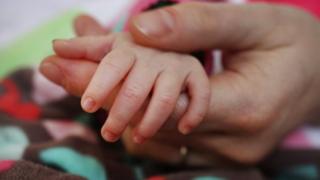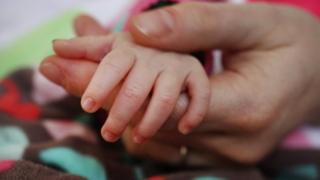NHS ‘should not pay’ US surrogacy costs after cancer misdiagnosis
The woman was awarded £1.14m in damages after doctors failed to spot her cervical cancer for years. …

 Image copyright Getty Images
Image copyright Getty Images A woman left infertile after doctors missed her cervical cancer for years should not get an NHS-funded surrogacy in the US, a court heard.
Whittington Hospital NHS Trust in London admitted negligent failure but said the commercial surrogacy she wanted was “contrary to public policy”.
The trust is appealing against a previous court’s decision to award the woman up to £1.14m in damages to cover the US costs.
The Supreme Court is hearing the case.
The hospital in Islington, north London, failed to detect signs of cancer in the woman, known as XX, for four years, and she was left infertile at the age of 29 after eventually undergoing chemo-radiotherapy.
She was initially awarded a total of £580,000 in damages, to cover the costs of fertility treatment, cryopreserving her eggs and having children by surrogacy in the UK.
However, the High Court refused to award further damages to cover the costs of four commercial surrogacies in California as the practice is illegal in the UK.
But last December, the Court of Appeal said XX, now 36, was entitled to an additional £560,000 to cover the cost of having children with commercial surrogates in the US.
Opening the trust’s appeal, Lord Faulks QC said it was a “very sad case” but awarding damages to cover commercial surrogacy “would be contrary to public policy”.
What is the law on surrogacy?
Surrogacy is where a surrogate mother agrees to carry a baby for someone else who will then become the child’s parent after birth.
Altruistic surrogacy – which is allowed in the UK – is where the surrogate does so voluntarily without being paid, while commercial – which is illegal in the UK – is where a woman receives money or other inducements beyond covering medical expenses.
Commercial surrogacy is allowed in certain US states such as California, Nevada and Maine.
The UK government also said any surrogacy agreements “cannot be enforced by the law”.
One of XX’s “central ambitions in life” is to have her own family and that, despite the “profound, distressing and life-altering injuries” caused by her treatment, her loss of fertility is her “major concern”, her lawyers said.
Her barrister, Christopher Johnston QC, said that both his client and anyone involved in the proposed commercial surrogacies “would not be transgressing any laws in the UK or California”.
He said XX has “very limited opportunities to have a baby from her own eggs”, with each attempt facing “a significant risk of failure”, and the trust’s appeal was an “attempt to censure (XX’s) reproductive choices”.
Mr Johnston also said that “in the UK, where surrogacy arrangements are unenforceable, there is the additional risk that the surrogate mother would keep (XX’s) baby”.
The Supreme Court will is expected to reserve its decision until the new year after a two-day hearing, which began on Monday.

